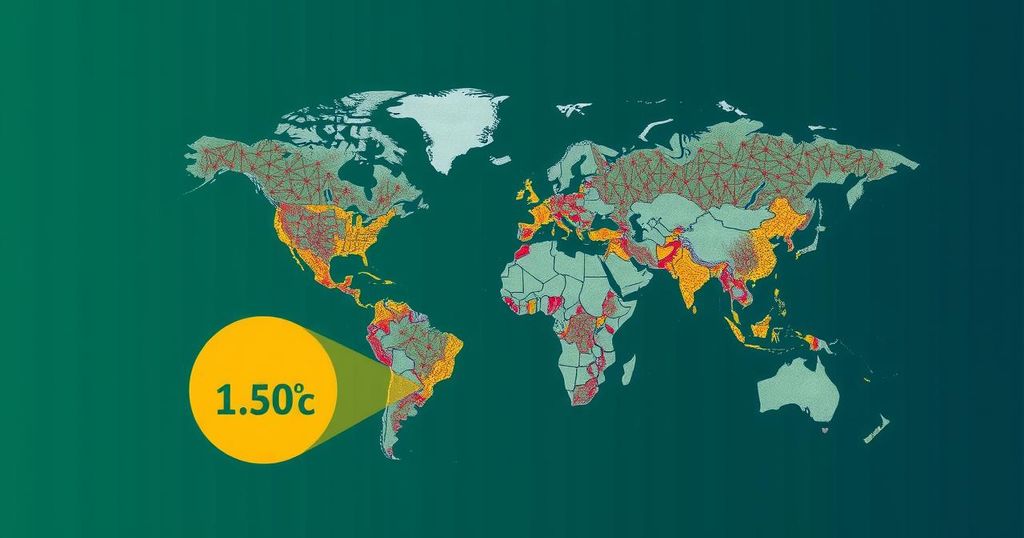A new UNEP report calls for global action to cut greenhouse gas emissions by 42% by 2030 and 57% by 2035 to meet the Paris Agreement’s 1.5°C goal. The report outlines the consequences of failing to enhance Nationally Determined Contributions (NDCs), predicting up to 3.1°C warming by century’s end without significant reductions. Nations are urged to commit to ambitious climate action in the upcoming COP29 talks, emphasizing the investment needed to transition to sustainable energy and address the climate emergency.
Recent findings from the UN Environment Programme (UNEP) emphasize that nations must urgently commit to significant greenhouse gas emissions reductions to preserve the goal of limiting the global temperature rise to 1.5°C, as designated by the Paris Agreement. The upcoming updates to Nationally Determined Contributions (NDCs) should target a reduction of 42% in annual emissions by 2030 and 57% by 2035. The UNEP’s “Emissions Gap Report 2024: No more hot air … please!” warns that without these ambitious commitments and immediate implementation, the world could experience an alarming temperature increase of approximately 2.6°C to 3.1°C by the end of the century, leading to devastating repercussions for ecosystems, economies, and communities globally. The report outlines that the projected temperature increases would occur under different scenarios of current policy implementations, with the stark reality of emission levels reaching a record high of 57.1 gigatons of carbon dioxide equivalent in 2023. António Guterres, the UN Secretary-General, indicates that this situation is already linked to more Extreme weather events. To mitigate the impact of climate change effectively, the report emphasizes that nations must enhance their NDCs to include substantial targets that encompass all relevant greenhouse gases, ensure transparency, and delineate how achieving sustainable development goals can coincide with emission reduction strategies. Moreover, the UNEP highlights that substantial investments are crucial for both mitigation efforts and transitioning towards sustainable energy sources. A minimum six-fold increase in climate mitigation funding is essential, highlighting the role of G20 nations, who bear the majority of global emissions, in leading these efforts. The report also points out that recent policy commitments, if executed correctly, could still align global efforts with the 1.5°C target, though achieving this would require unprecedented global coordination and commitment to action immediately ahead of the COP29 climate talks. Finally, the report urges that the perceived time for delay is over, requiring a thorough reassessment of ambitions and immediate steps toward implementation to avert the impending climate crisis.
The topic of the UNEP’s “Emissions Gap Report 2024” revolves around the increasing urgency for nations to reaffirm and enhance their climate commitments through Nationally Determined Contributions (NDCs). The context is rooted in the discussions born from the Paris Agreement, which set the framework for limiting global temperature increases. The report highlights critical findings about the current trajectory of emissions and the necessary actions that must be undertaken to avert significant climate challenges. Furthermore, it outlines pathways and strategies that could be employed by nations in the immediate future to meet these adequate targets and ultimately maintain a sustainable Earth. Key factors include the need for increased transparency in NDCs, enhanced international cooperation, and special focus on the financial investments required to transition to net-zero emissions. This background underpins the continual importance of collaborative global efforts to combat climate change effectively, as failing to bridge the emissions gap could lead to disastrous environmental, social, and economic consequences.
The UNEP’s “Emissions Gap Report 2024” serves as a clarion call for nations globally to urgently address the emissions gap that threatens the possible attainment of the 1.5°C climate target. It underscores the necessity for ambitious action and significant reductions in greenhouse gas emissions through enhanced Nationally Determined Contributions, particularly from G20 nations, which bear the responsibility of a substantial majority of global emissions. The report illustrates that while challenges remain, the potential to achieve emissions cuts exists; however, swift, coordinated, and transparent action is imperative to secure a sustainable future. In conclusion, immediate mobilization and commitment to those targets at upcoming climate talks are critical if the world is to avoid exceeding safe temperature thresholds and mitigating the arising catastrophic climate impacts.
Original Source: phys.org






